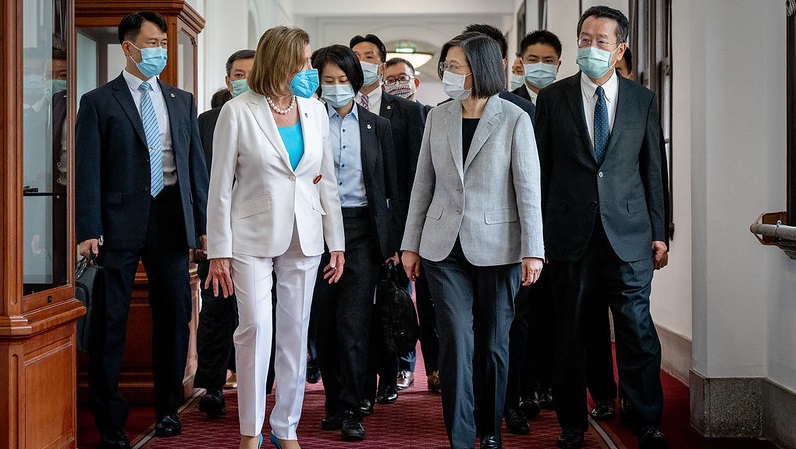Krzysztof Iwanek
In a previous commentary for The Diplomat, I argued that Russia and China have grown so close to each other over the past few years that India has no leverage to stop the process. Some of the replies to that text included this interesting point: regardless of the above, Moscow-Beijing cooperation does not hurt New Delhi’s core interests. It is a point worth considering.
One potential way to interpret this line of argument is that even if New Delhi does not have a way to stop Beijing and Moscow from deepening their partnership, whatever happened so far between them was not directed against India. With Russia being India’s partner and China being India’s rival, this is certainly how Moscow would like to portray things. New Delhi prefers to present this complex issue in the same way – otherwise, how could India explain its partnership with Russia?
The other way to read the point about not hurting national interests – and this is, I assume, what some commentators imply – is that India does have leverage, but we do not see it being used openly. In other words: The fact that Russia has not helped China hurt India in any way could be a result of New Delhi’s silent pressure. The element of backdoor diplomacy is indeed often raised in discussions on the relations in the tangled India-Russia-China triangle. It is believed that while New Delhi does not want to counter Moscow’s ties with Beijing openly (in order to avoid hampering its own partnership with Russia), it continues to send some signals to the Russians about forms of cooperation with the Chinese that India considers a redline.
However, hard facts speak against this. Silent pressure is, of course, impossible to properly analyze, unless one is an insider. However, if we see the Russians and Chinese issuing statements and performing actions that hurt India’s national interests – and we do – then the point about backdoor diplomacy becomes irrelevant. India’s silent pressure, whatever form it is taking, is clearly not working. And here are the facts that prove this.
First, Russia has been the biggest supplier of arms to China. Obviously, Russia has played exactly the same role for India. But I fail to see how this is not hurting India’s national interests. A better way to express this would be that Russia is hurting both India and China’s national interests by selling to both countries.
Second, China has clearly been treated as a more important client for Russian weapons than India (and overall, China is a much more important client for Russia than India is). Moscow sells some of its more advanced platforms to Beijing but not to New Delhi. This short list includes Su-35 fighter jets; it also used to include the S-400 system. In the latter case, the situation has admittedly changed: A few years after selling S-400s to the China, Russia exported the same product to India as well (and negotiations with New Delhi were being held at the same time as with Beijing).
One is also left to ponder why the BrahMos missile, jointly developed by Russia and India, has not been sold to any country for a number of years, even though it was reportedly of interest to many buyers among developing countries. One interpretation is that Russia was not inclined to sell the missile to any nation that could use it against China. This factor may have been hampering the prospects for export for years. However, it must be admitted that the decision by the Philippines (as announced in 2021) to buy BrahMos missiles will represent not only the first instance of exporting BrahMos but of the missile being purchased by a country that may well use it against China’s forces one day.
Third, what often goes unnoticed is that Sino-Russian exchange has strengthened India’s other rival: Pakistan. It is widely believed that Russia prefers India over Pakistan (when it comes to both security relations as well as political ties). This has been always true and remains true, and yet certain changes have occurred. Pakistan is no longer a country with which Russia has no security cooperation. Over the past few years, Moscow initiated joint military exercises with Islamabad and, more importantly, sold small batches of military helicopters to Pakistan. These were Mi-35Es and Mi-171Es; the latter, despite its civilian status, were used for military purposes as well (I covered the Russian arms exports to Pakistan in a 2019 commentary for The Diplomat).ADVERTISEMENT
Moscow’s warming up to Islamabad was not a part of growing Sino-Russian cooperation (at least there is no evidence it was). Neither did a speculated involvement of Russian companies in the China-Pakistan Economic Corridor materialize. The gossip about Russian involvement in coal plant construction in the Thar desert or in the Gadani power project in Balochistan (both of these being Chinese projects in Pakistan) turned out to be untrue. But there were other aspects that have linked the three countries in a way that hurt Indian national interests. The JF-17 fighter jet, jointly developed by China and Pakistan, uses Russian engines, the Klimov RD 93. It must be noted that this very aircraft was used to attack Indian territory during the 2019 tensions.
Fourth, Russia and China have also gone against Indian national interests on the narrative level. Russians are not inclined to criticize India in the context of Sino-Indian tensions; they clearly do not want to be seen as siding with either country. But Russian diplomats do indirectly criticize India when it comes to the China-U.S. rivalry. Here Moscow is clearly picking a side: with China against the United States. Hence any initiative that involves Washington’s cooperation with other countries against Beijing is criticized also by Russian diplomats, not only Chinese. While it is not India that is condemned here directly (but rather U.S.-led initiatives as such), India is one such state that cooperates with the United States against China.
Time and again, Russian diplomats have issued statements against the Quad, a grouping of four countries that includes India (and counters China). They have similarly been opposing the concept of the Indo-Pacific, which they see as an attempt to build a broader group of countries that are trying to counter growing Chinese influence (and I believe they are right about this objective). Again, India is as much a proponent of the Indo-Pacific as Russia is its critic.
That Russian diplomats were also asking India to join the Chinese Belt and Road Initiative (BRI) could have also been a diplomatic inconvenience for New Delhi, given its declarations that India will not join. I leave aside the fact that I never liked the discussions on “joining or not joining” the BRI. As the BRI is a not an organization, it does not offer formal membership. But what is important here is what Russia has been implying – that India should open itself to deeper economic cooperation with China and even partially endorse Beijing’s political narrative (on the BRI). Yet what we have witnessed over the last few years has been New Delhi trying to do the exact opposite.
There have been many instances of Moscow and Beijing going hand-in-hand in their diplomatic narratives over the last few years, of one country siding with the other on an issue important for one of the two powers, or for both. For instance, in 2017 U.S. President Donald Trump blamed Pakistan for the deteriorating situation in Afghanistan (and at least that time he was right). At this point Beijing spoke in Islamabad’s defense – and so did Moscow. In 2015, Russia’s initial attempt to hold a dialogue series on Afghanistan, inviting only the representatives of Beijing and Islamabad, went against New Delhi’s interests. Here, however, the Russians mended the mistake by later inviting India to the talks too. That China is in fact siding with Russia in its narrative on the invasion of Ukraine, rather than being neutral, as Beijing pretends to be, is another obvious factor. Russians have similarly criticized the AUKUS deal or the plan to place the U.S. THAAD missile system in South Korea (in the latter instance, the Russians and the Chinese even issued a joint statement against this, a fact I witnessed during the Xiangshan Forum in Beijing at the time).
All such initiatives or actions – the Quad, Indo-Pacific, AUKUS, THAAD in South Korea, and many more – are aimed at balancing the growing Chinese threat. Thus, all of them represent a direct or indirect benefit to India. At the same time, all of them have been diplomatically countered by Russia.
Certainly, in international relations words matter much less than weapons and money, but they hold their significance too. The diplomatic level only serves as additional evidence of how Sino-Russian cooperation is dangerous to India, and of how in recent years even the Russians have been vocal in stating that they stand with Beijing on a growing number of issues. Yet, even if one is to disregard the diplomatic narrative, the hard facts still stand on their own. That a Pakistani aircraft designed with China, and powered by a Russian engine, hit Indian territory is the most visible aspect of how Moscow-Beijing cooperation threatens New Delhi.
India’s diplomatic response to this has been ambiguous in a way which, in my opinion, has brought New Delhi more awkward moments than actual benefits. In 2017, India joined the Shanghai Cooperation Organization (SCO), an organization jointly led by China and Russia, but Pakistan was admitted to the body at the same time. This led to rather bizarre optics. While membership in the SCO involves (at least declarative) anti-terrorist cooperation and joint military drills, India is mostly threatened by terrorism emanating from one SCO member (Pakistan) and by the armed forces of another SCO member (China).
Similarly, while bilateral military exercises between India and China have been discontinued over the past few years, India is still accepting Russian invites to multilateral armed forces’ drills that happen to also host Chinese soldiers. Last time this happened was in 2022, despite Indian and Chinese soldiers fighting each other in Ladakh in 2020. Yet New Delhi canceled the participation of its diplomat in the opening ceremony 2022 Winter Olympics after it turned out that one of the Chinese soldiers that took part in the torch relay fought against the Indians in 2020. Somehow the participation of that man in a sports event was controversial for New Delhi, but engaging in military drills along the Chinese soldiers in Russia the same year was not. There is no word to describe the Indian government’s stand on this other than “incoherent.”
India, China, and Russia joining the same organizations, projects, or events is a detail used by Moscow to claim that it is striving to build bridges of friendship between New Delhi and Beijing. This is of benefit to Russian diplomacy which thus acquires more navigating space between India and China. But at the same this is a challenge for Indian diplomacy. New Delhi’s post-2020 position that India is now bolder in its dealings with China is being diluted by its other moves, such as the ones pointed to above. As backdoor pressure is clearly not yielding any benefits, in time India will likely be forced to draw its redlines on Sino-Russian cooperation openly.
(Source: The Diplomat)
















